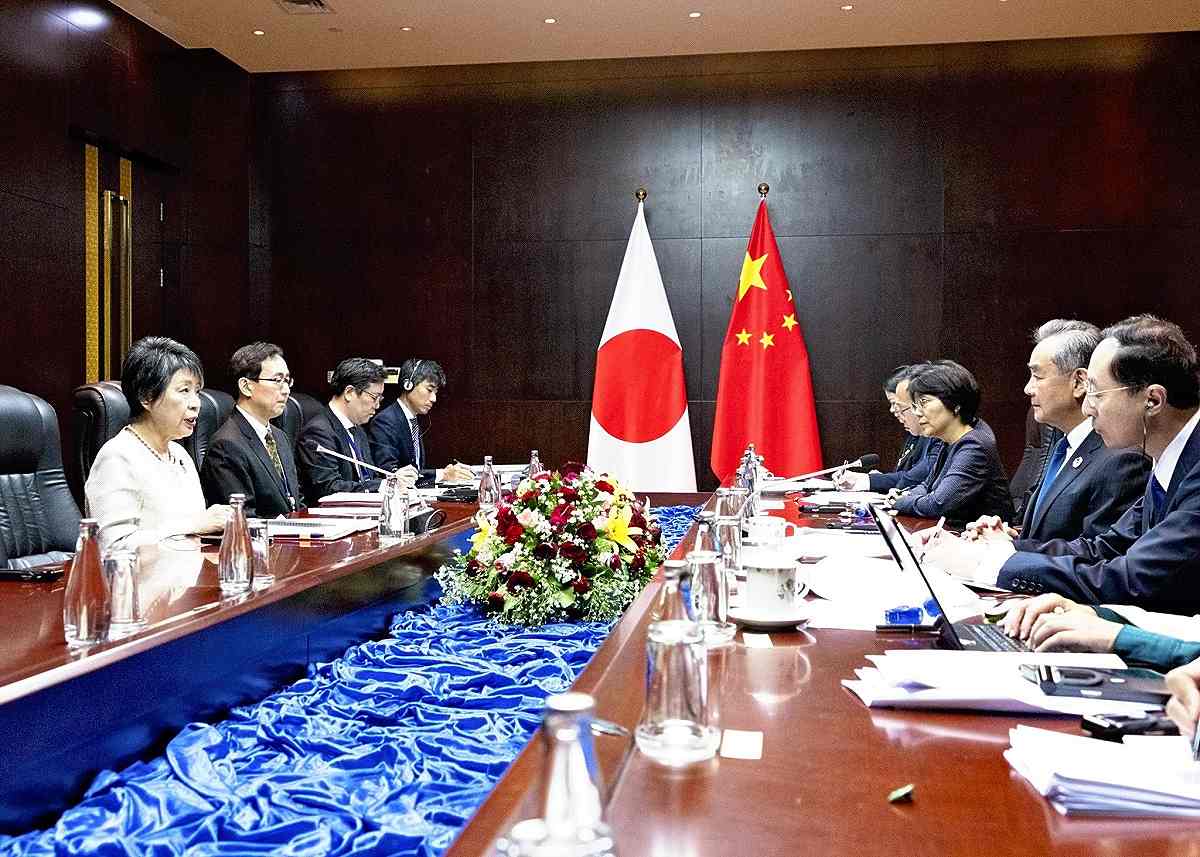Japan, China, Split Over Unresolved Issues, Agree on Promoting Ties; Both Sides Committed to Settling Unresolved Issues

Foreign Minister Yoko Kamikawa, far left, holds talks with her Chinese counterpart Wang Yi, second from right, in Vientiane on Friday morning.
17:23 JST, July 27, 2024
VIENTIANE — The foreign ministers of Japan and China agreed in talks in Vientiane on Friday to promote a mutually beneficial relationship based on common strategic interests, but unresolved issues, including the discharge of treated water from Tokyo Electric Power Company Holdings, Inc.’s Fukushima No.1 nuclear power plant, continue to drive a wedge between the two countries.
Nevertheless, Foreign Minister Yoko Kamikawa and her Chinese counterpart Wang Yi, a member of the political bureau of the Chinese Communist Party, confirmed that they would continue dialogue to settle the unresolved issues.
The talks were the first in about eight months, with the last such meeting held in November last year.
During the talks, which lasted about 50 minutes, the two ministers agreed to continue communicating through mutual visits to each other’s country.
During the meeting, Kamikawa noted, “More than a few difficult issues exist between Japan and China.”
She also stressed, “The important thing is for both sides to make efforts toward progress while coexisting as neighbors and members of the international community.”
She then called strongly for an immediate end to the import ban on Japanese marine products that China imposed over the discharge of treated water, the release of Japanese nationals detained by China, and for China to take action regarding the buoys it has set up in Japan’s exclusive economic zone.
In response, Wang reiterated China’s unchanged position, describing the treated water as “nuclear-contaminated water.”
No progress was made on other issues as well.
The Chinese administration under President Xi Jinping has made little room for compromise on such unresolved issues as the discharge of treated water and shown displeasure over the recent joint exercises between the Japan Coast Guard and Taiwan’s Maritime Police (equivalent to the JCG), which were conducted with China in mind.
Despite all that, China held foreign ministerial talks with Japan — likely because it wants to further economic cooperation with Japan to attract investments from Japanese companies amid its own sluggish economy.
According to the Chinese Ministry of Foreign Affairs, Wang expressed his country’s intention to promote strategic and mutually beneficial relations with Japan and called for strengthening cooperation between the two countries.
The Japanese government intends to expand the areas of cooperation — centered on economic cooperation — while seeking a summit meeting between Prime Minister Fumio Kishida and Xi to find ways to settle the unresolved issues.
Top Articles in Politics
-

Japan PM Takaichi’s Cabinet Resigns en Masse
-

Sanae Takaichi Elected Prime Minister of Japan; Keeps All Cabinet Appointees from Previous Term
-

Japan’s Govt to Submit Road Map for Growth Strategy in March, PM Takaichi to Announce in Upcoming Policy Speech
-

LDP Wins Historic Landslide Victory
-

LDP Wins Landslide Victory, Secures Single-party Majority; Ruling Coalition with JIP Poised to Secure Over 300 seats (UPDATE 1)
JN ACCESS RANKING
-

Producer Behind Pop Group XG Arrested for Cocaine Possession
-

Japan PM Takaichi’s Cabinet Resigns en Masse
-

Man Infected with Measles Reportedly Dined at Restaurant in Tokyo Station
-

Israeli Ambassador to Japan Speaks about Japan’s Role in the Reconstruction of Gaza
-

Videos Plagiarized, Reposted with False Subtitles Claiming ‘Ryukyu Belongs to China’; Anti-China False Information Also Posted in Japan




















